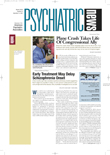To help primary care professionals respond to the mental health consequences of terrorism and natural disasters, psychiatrists are participating in a new national initiative that has funding from the Robert Wood Johnson Foundation.
Although little research has been done on primary care visits since September 11, “primary care physicians, nurses, and nurse practitioners are telling us that they are seeing an increase in somatic complaints, domestic violence, and bullying,” said Margaret Heldring, Ph.D., president and CEO of America’s HealthTogether.
She spoke at a one-day meeting last month on the psychological consequences of terrorism and response systems sponsored by the Institute of Medicine in Washington, D.C.
America’s HealthTogether, based in Washington, D.C., is a bipartisan public policy educational group committed to coordinating solutions to the challenges of the current crisis in health care. It is cochaired by former U.S. Senator and Democratic presidential candidate Bill Bradley and former U.S. Senator David Durenberger.
Several organizations, including APA, the American Academy of Child and Adolescent Psychiatry, and the AMA, have agreed to be partners in the new initiative with America’s HealthTogether.
The goal of the initiative, known as “Mental Health and Primary Care in a Time of Terrorism,” is to ensure that the primary care system is equipped to handle the predicted increase in patients with mental health issues following a manmade or natural disaster, said Heldring.
The majority of people turn to their primary care physician or nurse practitioner when they have some type of mental health problem, said Heldring. Studies have shown that up to 75 percent of all primary care visits involve psychosocial problems that are manifested as nonorganic somatic complaints, she said.
“The primary care system represents an enormous capacity for responding to terror and disasters in addition to everyday patients with mental health and substance abuse disorders,” said Lloyd Sederer, M.D., executive deputy commissioner for mental health hygiene in New York City, in an interview.
Sederer, in his prior position as director of APA’s Division of Clinical Services, obtained APA’s endorsement of the project. The Robert Wood Johnson Foundation awarded the initiative a one-year grant of approximately $600,000, which began last August, said Heldring.
Primary care professionals face many barriers to attending to patients’ psychological problems, including the volume of people they see in one hour and a lack of training, said Sederer. “In addition, they are also typically not reimbursed for services beyond brief medication visits. Case management, which has proven successful in people with all types of chronic disorders, is also not reimbursed,” said Sederer.
Recommendations to reduce reimbursement barriers in primary care settings will be included in a report issued by America’s HealthTogether next spring. Recommendations for promoting resiliency in people facing potentially traumatic events and clinical interventions for primary care settings given the present constraints will also be included in the report, said Heldring.
The recommendations for primary care settings will be made by national and international trauma experts at a spring convention sponsored by America’s HealthTogether. They will review the results of a national survey of primary care professionals to be conducted by America’s HealthTogether early next year.
The trauma experts will also review clinical and anecdotal experiences of primary care professionals, psychiatrists, and mental health professionals since September 11 and gaps in knowledge among primary care professionals, said Heldring.
Psychiatrists and trauma researchers who are advising America’s HealthTogether include Carol North, M.D., a professor of psychiatry at Washington University in St. Louis, and Wayne Katon, M.D., a professor of psychiatry at the University of Washington in Seattle, said Heldring.
The conference participants will also incorporate their research and experiences with traumatized populations into the report’s recommendations, said Heldring.
“The spring report will be distributed to all participating organizations, the American Red Cross [a consulting partner], the media, and members of Congress. We plan to issue a final progress report next fall that will also address some of the global issues related to integrating mental health care into primary care settings,” said Heldring.
Information on the Mental Health and Primary Care in a Time of Terrorism initiative is posted on the America’s HealthTogether Web site at www.healthtogether.org/healthtogether/programs/mentalHealth.html. ▪
